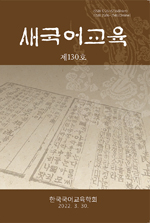목적: 본 연구의 목적은 학습자의 요구와 상황을 충족하는 교재 개정이 필요하다는 전제하에 기존의 한국어 교재에 범용적으로 적용할 수 있는 유의미한 교재 개정 원리를 도출하는 데 있다. 방법: 양적 연구 방법과 질적 연구 방법을 병행한 혼합 연구로 진행하였다. 양적 연구는 한국어 교원 125명과 한국어 학습자 105명을 대상으로 교재 사용의 만족도와 문제점을 묻는 설문조사를 실시하고, SPSS 25.0 프로그램을 이용하여 통계분석을 하였다. 질적 연구는 한국어 교원 6명을 대상으로 심층 면담을 하여 한국어 교재 개정이 어떠한 부분에 초점을 두어야 하는지를 확인하였다. 결과: 설문조사에서는 한국어 교원 및 학습자는 교재에 대한 만족도가 높은 편이었으나 고정관념, 문화권별 학습 내용의 부적합성, 교재의 오탈자나 오류, 삽화·사진의 성별 불균형 등의 문제가 있음을 확인하였다. 또한 심층 면담을 통해 교재 개정 시 학습자 문화의 특수성, 시의성의 문제, 학습자 개인의 상황에 맞지 않는 발화, 불명확한 지시문 등을 고려해야 함을 알 수 있었다. 결론: 한국어 교재 개정 원리는 ‘현지화’, ‘현대화’, ‘개인화’, ‘명료화’의 원리를 도출하였다. 이는 학습자의 요구와 상황을 충족하는 맞춤형 한국어교육을 위한 구체적인 실현태로 작용할 수 있을 것이다.
Purpose: The purpose of this study is to find a meaningful textbook revision principle that can be universally applied to existing Korean textbooks under the premise that textbook revisions that meet the needs and circumstances of learners are necessary. Methods: In order to accomplish this research purpose, a mixed study was conducted in which both quantitative and qualitative research methods were combined. Questionnaires and surveys were conducted from 125 Korean language teachers and 105 Korean language learners to ask about their satisfaction with the use of textbooks and problems. The SPSS statistics was used for data analysis. Interviews were conducted from 6 Korean language teachers to confirm the focus of the revision of Korean textbook. Results: The findings of data analysis showed that 1) In the survey Korean teachers and learners were highly satisfied with the textbook, but it was confirmed that there were problems such as stereotypes, inappropriate learning contents by culture, typos or errors in textbooks, and gender imbalance in illustrations and photos, 2) it was found that the specificity of the learner’s culture, issues of timeliness, utterances that do not fit the individual learner’s situation, and unclear instructions or illustrations should be considered when revising textbooks through interviews. Conclusion: The principle of revision of Korean textbooks was derived from the principles of ‘localization’, ‘moderni- zation’, ‘personalization’, and ‘clarification’. This contributes to customized Korean education that meets the needs and circumstances of learners.
1. 서론
2. 선행 연구 검토
3. 교재 개정 원리 연구 방법
4. 한국어 교재의 개정 원리
5. 결론
참고문헌
(0)
(0)
